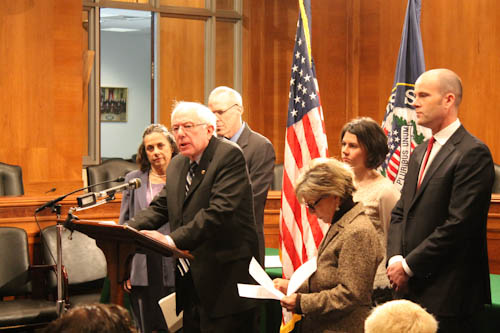
Senators Bernie Sanders and Barbara Boxer, along with representatives of many mainstream environmental groups and think tanks, announce comprehensive climate change legislation, February 14, 2013, on Capitol Hill. Photo by George Zornick.
In the midst of a heightened conversation on combating climate change—as thousands of protestors are headed to DC this weekend to protest against the Keystone XL pipeline project, and as President Obama increasingly uses his bully pulpit to talk about the issue—the Senate is now jumping into the fray.
Senators Bernie Sanders and Barbara Boxer announced comprehensive climate change legislation Thursday morning at a news conference on Capitol Hill that aims to reduce greenhouse gas emissions 80 percent by 2050. It’s an ambitious bill that doesn’t settle for half-measures, but rather lays out an actual solution to the climate crisis. “This is a gold-standard bill,” Boxer said. “Every once in a while we have them.”
The lawmakers are putting the finishing touches on the initial version of the bill, but here are some features of the imminent legislation:
-
A price on carbon or methane equivalent of $20 per ton. That amount rises 5.6 percent annually for ten years.
-
The carbon price applies only to “upstream” producers, that is, the points of origin for fossil fuels—coal mines, oil refineries, natural gas processing points and so on. It would also apply to any imported fossil fuels, at the point of importation.
-
The price also applies to only 2,869 of the largest fossil fuel polluters, which covers 85 percent of US greenhouse gas emissions.
-
The carbon price would raise $1.2 trillion in revenue, according to the CBO. A large portion of that revenue would go towards investments in clean energy and energy efficiency: weatherizing 1 million homes per year, tripling the federal budget for energy research and development via ARPA-E, and creating a $500 billion sustainable technologies finance program, and providing worker training for clean energy technologies, among other initiatives. Using revenue from the carbon price and from ending subsidies to oil and gas companies, the Sanders-Boxer legislation would also pay $300 billion towards deficit reduction.
-
Since this would likely boost natural gas production, the bill contains several fracking safeguards: it ends current fracking exemptions from the Safe Drinking Water Act, and heightens disclosure requirements for fracking chemicals.
Popular
"swipe left below to view more authors"Swipe →
Many people’s immediate response to this bill is: it will never pass. Never mind the Republicans filibustering it in the Senate and never even taking it up in the House; President Obama hasn’t endorsed it and called for a different approach based on cap-and-trade during his State of the Union speech, and Harry Reid might not even put it on the Senate floor for fear of making vulnerable senators take a tough vote. (Asked Thursday morning if he received any promises from Reid that the legislation would receive a floor vote, Sanders implied he hadn’t: “I have over the years talked to Senator Reid on this issue. In general, he is sympathetic, but we’ll see how he and other leaders come down on this in the months to come.”)
But both Sanders and Boxer think the bill can create a serious public discussion on climate change that could lead to its passage. They’ve mobilized several mainstream environmental groups to fan out across the country and whip up support: Bill McKibben, president of 350.org, spoke at Thursday morning’s announcement, as did representatives from the Center for American Progress, the Sierra Club, Public Citizen, and the National Community Action Foundation. In other words, this isn’t a one-off messaging bill: they want to try to get it passed.
The Senators repeatedly stressed it was up to the movement, and the people, to make this bill law. “The United States Congress is way behind where the American people are on this issue,” said Sanders. “And we’re going to win this fight when millions of people stand up and say ‘you have got to do something for my kids, and grandchildren, and for my business—you cannot ignore this planetary crisis.’”
Boxer added: “The people are the ones who are in control of what happens. And that’s a great thing. Because they are so far ahead of us. They know what they are seeing. No big oil company can sit down in their living room and tell them Superstorm Sandy didn’t happen, or droughts didn’t happen, or fires, or this bark beetle, or all these other things they see happening in front of their eyes,” she said. “We think the community is the key.”
The one thing Boxer can control, as chair of the Senate Environment and Public Works Committee, is hearings and mark-ups on this bill, which she anticipates will happen this spring. The first step for the bill’s defenders will be focusing national attention on these hearings.
Already, protestors have been marching in Washington against the Keystone pipeline, George Zornick reports.


